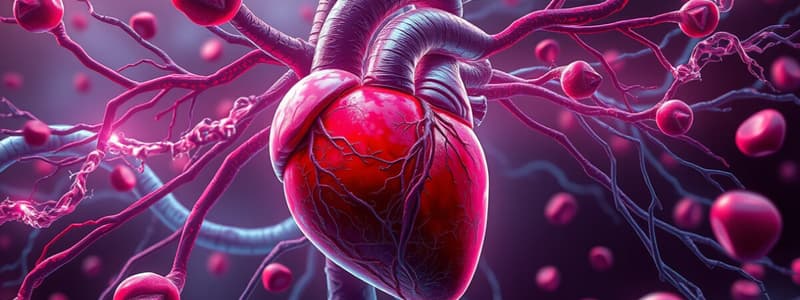Podcast
Questions and Answers
What is one of the primary functions of the heart in the cardiovascular system?
What is one of the primary functions of the heart in the cardiovascular system?
- Regulate body temperature
- Transport oxygen from cells
- Pump blood through blood vessels (correct)
- Defend against disease
Blood transports nutrients away from cells.
Blood transports nutrients away from cells.
False (B)
What is one of the components of the cardiovascular system?
What is one of the components of the cardiovascular system?
blood vessels
The blood helps to regulate ______ balance and temperature.
The blood helps to regulate ______ balance and temperature.
Match the function of blood with its description:
Match the function of blood with its description:
What is the primary role of blood in relation to cellular waste?
What is the primary role of blood in relation to cellular waste?
How does blood contribute to the body's defense mechanisms?
How does blood contribute to the body's defense mechanisms?
Which of the following is NOT a function of the cardiovascular system?
Which of the following is NOT a function of the cardiovascular system?
What is one of the key components of blood that helps in regulating water content?
What is one of the key components of blood that helps in regulating water content?
What is the primary function of the heart in the cardiovascular system?
What is the primary function of the heart in the cardiovascular system?
Flashcards are hidden until you start studying
Study Notes
Cardiovascular System Overview
- Comprises three main components: blood, heart, and blood vessels.
Functions of the Cardiovascular System
-
Heart Function: Acts as a pump, propelling blood throughout the network of blood vessels.
-
Oxygen and Nutrient Transport: Blood delivers oxygen and essential nutrients to cells, facilitating cellular functions.
-
Waste Removal: Transports carbon dioxide and metabolic wastes away from cells, ensuring detoxification and homeostasis.
-
Regulation of Acid-Base Balance: Blood plays a key role in maintaining the pH level of body fluids, crucial for overall metabolic processes.
-
Temperature Regulation: Helps in maintaining body temperature through the distribution of heat generated by metabolic activities.
-
Water Content Maintenance: Blood components are integral in regulating the water content of body fluids, aiding in fluid balance.
-
Defense Against Disease: Various blood components, such as white blood cells, provide immunity and protect the body from pathogens.
-
Repair Mechanisms: Blood components, including platelets and clotting factors, are essential for repairing damaged blood vessels and minimizing blood loss.
Cardiovascular System Overview
- Comprises three main components: blood, heart, and blood vessels.
Functions of the Cardiovascular System
-
Heart Function: Acts as a pump, propelling blood throughout the network of blood vessels.
-
Oxygen and Nutrient Transport: Blood delivers oxygen and essential nutrients to cells, facilitating cellular functions.
-
Waste Removal: Transports carbon dioxide and metabolic wastes away from cells, ensuring detoxification and homeostasis.
-
Regulation of Acid-Base Balance: Blood plays a key role in maintaining the pH level of body fluids, crucial for overall metabolic processes.
-
Temperature Regulation: Helps in maintaining body temperature through the distribution of heat generated by metabolic activities.
-
Water Content Maintenance: Blood components are integral in regulating the water content of body fluids, aiding in fluid balance.
-
Defense Against Disease: Various blood components, such as white blood cells, provide immunity and protect the body from pathogens.
-
Repair Mechanisms: Blood components, including platelets and clotting factors, are essential for repairing damaged blood vessels and minimizing blood loss.
Studying That Suits You
Use AI to generate personalized quizzes and flashcards to suit your learning preferences.




